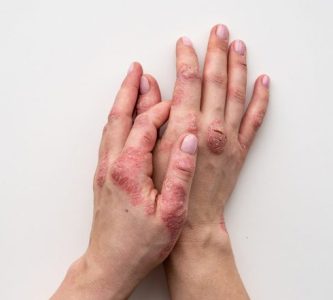- 1 Farrer Park Station Road #12-18 Connexion Singapore 217562
Psoriasis

What is psoriasis?
Psoriasis is an inflammatory skin disease characterised by an increased rate of skin cell turnover, resulting in thick scales appearing on the skin. The affected skin becomes dry and often itches. Psoriasis usually presents with red scaly patches on the scalp, body and limbs. The scaly patches on the scalp are usually thicker and more extensive than ordinary dandruff. Common body sites affected include the elbows, knees and back.
How can I make my psoriasis better?
- Use treatments regularly as directed.
- Apply moisturisers regularly to reduce itching and scaling.
- Adopt healthy lifestyle habits, eat in moderation, exercise regularly and manage your stress levels.
- Go for regular health screening as obesity, diabetes, high blood pressure and cholesterol problems are more common in psoriasis patients.
- Monitor for any joint pain or swelling as some psoriasis patients also have their joints affected (psoriatic arthritis).
- Do not scratch the patches as this may damage the skin and worsen your psoriasis.
What treatments are available for psoriasis?
The treatment options for psoriasis can be divided into 4 main groups; topical treatment, phototherapy, oral medication and biologics. Your dermatologist will propose the best treatment plan after a detailed consultation and examination
DISCLAIMER:
The information written and published on this website is not intended to substitute the recommendations of a trained professional and does not replace a professional consultation.
It is advisable to undergo a formal consultation to help establish a relationship between the doctor and yourself, accurately determine your concerns/problems, and get the appropriate treatments for them.
It is also imperative to note that the contents of the website with respect to treatments, results and pricing can vary from individual to individual, and can only be accurately determined by the doctor upon diagnosis.
Do note that all medical treatments will only be administered upon proper consultation, with the requirement that patients be above 21 years of age to provide legal consent.




